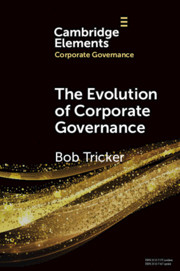The Evolution of Corporate Governance
Part of Elements in Corporate Governance
- Author: Bob Tricker, University of Oxford
- Date Published: January 2021
- availability: Not yet published - available from October 2024
- format: Paperback
- isbn: 9781108965422
Paperback
Other available formats:
eBook
Looking for an inspection copy?
This title is not currently available for inspection. However, if you are interested in the title for your course we can consider offering an inspection copy. To register your interest please contact [email protected] providing details of the course you are teaching.
-
In this Element the origins of corporate governance are reviewed, recognising that corporate entities have always been governed, that important developments took place in the seventeenth and eighteenth centuries, and the huge significance of the invention of the joint-stock limited liability company. The development of corporate governance in the twentieth century around the world is explored, with complex groups, private companies, and top management dominating shareholder power appearing in the Inter-war years. Some unresolved issues in both principle and practice are identified. Various theories of corporate governance are described and contrasted. The subject is seen to be in search of its paradigm and a systems theoretical relationship between the theories is suggested. The need to rethink the concept of the limited liability company is argued, and a call is made for the development of a philosophy of corporate governance.
Customer reviews
17th Oct 2024 by UName-1127682
The Evolution of Corporate Governance refreshes our memory of the journey of Corporate Governance (CG) development in the past decades. The book points out many different business and economic theories along this journey, explains the connection, relevance, and mis-alignments of these theories with CG. This part is very helpful for us to understand the influences of these theories to CG evolution. Most importantly, identifying unresolved issues in both principle and practice, challenging the formality of business organizations given the complexity of today's business models, and calling for rethinking of CG philosophy by Bob Tricker, the Father of Corporate Governance, I believe The Evolution of Corporate Governance is opening a new Chapter of future CG research, development, innovation and practice for scholars, practitioners, regulators and companies. Highly recommend this book to anyone who's interested in exploring, learning and researching corporate governance topics.
Review was not posted due to profanity
×Product details
- Date Published: January 2021
- format: Paperback
- isbn: 9781108965422
- length: 75 pages
- dimensions: 150 x 230 x 5 mm
- weight: 0.12kg
- availability: Not yet published - available from October 2024
Table of Contents
1. Introduction
2. The origins of corporate governance
3. The development of corporate governance in the twentieth century
4. Crisis and reform in corporate governance in the twenty-first century
5. The frontiers of corporate governance
6. The relevance of culture
7. Corporate governance in theory
8. A subject in search of its paradigm
9. Rethinking the joint-stock limited liability company
10. Towards a philosophy of corporate governance
11. Conclusions.
Sorry, this resource is locked
Please register or sign in to request access. If you are having problems accessing these resources please email [email protected]
Register Sign in» Proceed
You are now leaving the Cambridge University Press website. Your eBook purchase and download will be completed by our partner www.ebooks.com. Please see the permission section of the www.ebooks.com catalogue page for details of the print & copy limits on our eBooks.
Continue ×Are you sure you want to delete your account?
This cannot be undone.
Thank you for your feedback which will help us improve our service.
If you requested a response, we will make sure to get back to you shortly.
×





